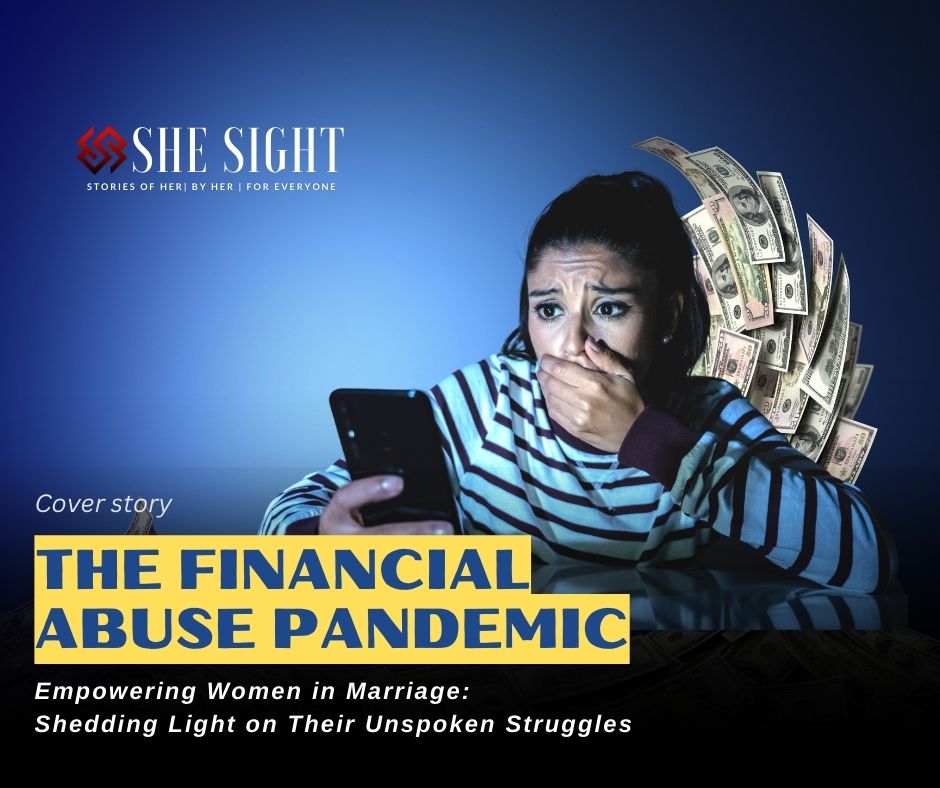The Financial Abuse Pandemic

Empowering Women in Marriage: Shedding Light on Their Unspoken Struggles
Within a society that upholds traditional gender roles and expectations, women frequently encounter the troubling issue of financial abuse. This insidious form of mistreatment often remains hidden, perpetuating harmful cycles of control and dependency, with the struggles endured by women going unnoticed by many.
In the realm of abusive relationships, financial abuse is a pervasive issue that can manifest in various contexts. While it is important to acknowledge that financial abuse can occur in relationships beyond marriage, such as between siblings, parents, friends, and even within workplaces, this article specifically focuses on the framework of marriage. By narrowing the scope to abuse perpetrated by spouses, we aim to shed light on the unique dynamics and challenges faced by individuals experiencing financial abuse within the context of marriage.
Rinki,(name changed) a young Indian woman, experienced firsthand the devastating effects of financial abuse. Her story serves as a powerful example of the challenges faced by countless women around the world.
Rinki’s Dreams and the Illusion of Happiness: Rinki’s journey began with a hopeful marriage at the age of 22, as per the Indian tradition of arranged marriages. Despite being a qualified engineer with aspirations to work, she faced resistance from her husband and family. Their reasoning? “What’s the necessity for you to work when I’m earning so much?” These words masked a dangerous form of control that would leave Rinki vulnerable in the years to come.
The Deterioration of Rinki’s Marriage: As Rinki settled into her new life abroad, she discovered her husband’s infidelity and endured physical abuse when she dared to question him. Stranded in a foreign land without a support system, she felt helpless and trapped. After three years of enduring this ordeal, Rinki made the courageous decision to leave the marriage, returning to India with her child.
The Financial Consequences of Abuse: Quite expectedly, financial hardships awaited her, as her parents were unable to support her due to existing debts from her extravagant wedding.
Rinki’s story sheds light on the financial ramifications of financial abuse in marriages. The social conditioning that working is primarily important for men perpetuates the notion that a woman’s earnings are merely supplementary. Consequently, many women find themselves in situations where they have no access to money, are subjected to excessive scrutiny of their expenses, or are coerced into giving up their own income. Financial control and manipulation become tools for abusers to maintain dominance and power.
This story serves as a powerful reminder of the silent yet pervasive issue of financial abuse within marriages. In this traditionally arranged marriage, she faced numerous challenges and restrictions that denied her the opportunity to exercise her financial independence. As we explore further into Rinki’s personal journey, we uncover the various forms of financial abuse individuals endure, shedding light on a larger problem that affects countless people worldwide.

The Trap of Dependency
Rinki’s aspirations to work as an Engineer were stifled by her husband, Nitesh,(name changed) who dismissed her desires with the question, “What’s the necessity for you to work when I’m earning so much?” Sadly, this sentiment was echoed by her family, reinforcing the societal conditioning that women entering an NRI (Non-Residential Indian) family should not prioritize work and earning.
This aspect of financial abuse reveals a trap designed to confine women within the bounds of their relationship. By discouraging work and eroding self-confidence, women are left financially dependent on their spouses, perpetuating a power dynamic that can lead to further control and abuse.
Unveiling the Forms of Financial Abuse
As we explore the various forms of financial abuse within marriages, Rinki’s story intertwines with the experiences shared by countless victims. We conducted a survey on social media, inviting them to share instances of abuse.
These examples shed light on the insidious tactics employed to maintain control and manipulate the financial autonomy of their partners.

Note: To safeguard the privacy and anonymity of the individuals involved, all names used in this article are pseudonyms or have been changed.
1. Withholding and Control
In many cases, partners exercise control by withholding financial resources, hindering the victim’s access to the money needed for personal expenses. Statements such as “Why do you need so much?” are common tactics used to deny financial independence.
“I still remember the fear that gripped me every time I hesitated to spend even $10. Throughout our entire relationship, he constantly asserted that the money was his, despite our agreement that I would be a stay-at-home mom. I would only use the debit card for essential items like diapers and baby food, but even then, he would demand to see the transactions. Eventually, I couldn’t spend a single penny without his scrutiny. Finally, when I managed to get a job for myself, he wanted my hard-earned money too. This was my reality, and it took a toll on me over the years. I know people may ask, “Why didn’t you leave?” But it’s not that simple. I didn’t stay because I loved him, but out of fear, confusion, and not knowing how to escape the situation, especially with the kids involved. Now, almost a year after our divorce, I’m still trying to rebuild my life and regain my independence.” This is Natalie’s (name changed) firsthand account.
2. Monitoring and Excessive Control
Complete financial control lies solely with the spouse, who may restrict access to bank accounts and credit cards. This monitoring of finances leads to excessive control over the victim’s spending, creating a power dynamic that disempowers and isolates.
Amy (name changed), a survivor of financial abuse, shared her experience of her partner controlling her hobbies and interests, saying, “You’re not going unless you do as I say.” This chilling account highlights the suffocating grip of financial control in abusive relationships.
3. Withholding Financial Means
In some instances, spouses exploit their partners’ income by giving them only a portion of their earnings to manage household expenses. This form of financial abuse restricts the victim’s autonomy and perpetuates a cycle of dependence.

“I’ll never forget the day Saad (name changed) set up a checking account in my name. All of my hard-earned paychecks went into that account, yet I was forbidden from accessing it. It was a constant reminder of the control he exerted over me, leaving me feeling trapped and powerless.” Another survivor shares the abuse she underwent.
4. Using Income for Personal Desires
There are instances where spouses misuse their partner’s income, disregarding their financial contributions and depriving them of the ability to fulfill their own needs. This form of emotional and financial manipulation results in an unequal distribution of power within the relationship.
“I can’t get over the frustration of watching Lin spend all his money recklessly, without any consideration for our financial responsibilities. It left me with the burden of being the responsible one, paying the bills, and ensuring our financial stability. Sadly, I couldn’t enjoy any of the money I had worked so hard to earn. It was a constant struggle, feeling like my efforts were being taken for granted while I had to bear the weight of financial responsibilities alone.” recalls Hana (name changed).
5. Hiding Assets and Liabilities
Hiding assets, and liabilities, and engaging in financial deception further exacerbates the abuse. Survivors find themselves burdened with debts and financial obligations they were unaware of, leading to long-term financial instability.
“Two years ago, I vividly remember my partner constantly insisting that groceries cost us Rs.5000 per week. So, I worked harder, taking on extra shifts to meet these exorbitant expenses. Yet, much to my shock, I recently discovered that she had been hoarding cash all along. She used that money to pay her high-priced divorce lawyer and even took her friends on a luxurious vacation. The deceit and manipulation left me feeling betrayed and financially drained.” Narrates Samay (name changed).
6. Exploiting Income Disparities
Partners who refuse to work or contribute financially, while relying on their spouse’s income, impose an unequal burden on the victim. The victim’s hard-earned money is used to support the lifestyle of the non-working partner, leaving them trapped and financially vulnerable.
“I could never understand why my ex, Mark (name changed), adamantly refused to get a full-time job. He believed that anything he was qualified for was beneath him. It was frustrating and disheartening to witness his unwillingness to contribute financially, leaving me to shoulder the burden of our expenses.” narrates Delia (name changed).
7. Financial Sabotage
Financial sabotage becomes another tactic to exert control. By deliberately hindering the victim’s job prospects or career growth, the abuser perpetuates dependence and restricts the victim’s ability to escape the abusive relationship.
“As a victim of financial abuse, I experienced the detrimental effects of my partner constantly quitting his job while I remained dedicated to mine for 12 years. This pattern not only caused financial instability but also hindered my career growth, as I was forced to prioritize stability over pursuing new opportunities. The imbalance in our financial contributions and the control exerted over my career choices perpetuated the cycle of dependency and control within the relationship.” Laila (name changed) talks about the abuse her partner put her through.
8. Emotional Manipulation and Exploitation
Emotional manipulation and exploitation intertwine with financial abuse, further deepening the victim’s sense of helplessness. The abuser may use guilt, shame, or threats to manipulate the victim into complying with their financial demands, ensuring their continued control.
“In my late twenties, during a 10-year relationship, my partner threatened me, saying I shouldn’t get pregnant because then he could afford a lawyer better than I could. I was deeply disturbed by his exact words and the control he exerted over my reproductive choices.” That’s Sanjana’s (name changed) story.
9. Coercion into Illegal Activities
In some cases, the abuser may coerce the victim into engaging in illegal financial activities, exposing them to legal consequences and further compromising their financial security. The victim becomes trapped in a cycle of fear and dependency, unable to break free from the abusive dynamic.
“I never thought love would lead me to commit fraud. Mark coerced me into participating in identity theft, manipulating my fears and dependency. I was trapped in a web of deceit, engaging in fraudulent schemes that shattered my financial security. I longed to escape the cycle of crime, but the fear of retaliation kept me captive, living a life I never imagined.” Lovina (name changed) shudders at what life she led before she was rescued by her sister.
10. Economic Instability
Creating financial instability through excessive debt or reckless spending is another form of financial abuse. The abuser may accumulate debt in joint accounts or spend recklessly, leaving the victim burdened with the consequences and destabilizing their financial future.
11. Denial of Essential Expenses
Denying access to funds needed for essential expenses, such as healthcare or education, is a particularly insidious form of financial abuse. By withholding financial resources crucial for basic needs, the abuser maintains control and power over the victim’s well-being.
12. Restricted Financial Involvement
The abuser may prevent the victim from participating in financial decisions and exclude them from joint accounts or financial planning discussions. This isolation and exclusion reinforce the power imbalance and perpetuate the victim’s financial dependence.
13. Damaging Credit Histories
Manipulating financial transactions and credit can have long-lasting consequences for the victim. The abuser may intentionally damage the victim’s credit history by running up debts in their name or sabotaging their credit rating, leaving the victim financially vulnerable and unable to access future financial opportunities.
“My ex would constantly have my key card canceled, leading to embarrassing moments at the grocery store when it would decline. But what baffled me, even more, was how quickly he would contact the bank to reinstate the card when I called to inform him of the declined payment. It was as if he wanted to control every aspect of our finances. He made sure I had no access to joint funds to pay for essential items, leaving me feeling helpless and dependent.” Narrates Amara (name changed).
14. Exploiting Joint Tax Responsibilities
Exploiting joint tax responsibilities becomes another method of financial abuse. The abuser may refuse to contribute to tax obligations, leaving the victim solely responsible for unpaid taxes and potentially facing legal consequences.
“I can’t forget the countless times he insisted that I work and contribute half the rent, but conveniently neglected to provide me with commute money to even get to my job. It baffled me how he always seemed to have money for alcohol, while I struggled to make ends meet. On top of that, he would bounce child support checks and shift the blame onto my bank. The final blow was discovering that he had lied about paying our joint taxes. These experiences left me feeling deceived and financially vulnerable.” Shares Liyoni (name changed).
15. Drain on Joint Resources
Abusers who engage in substance abuse or addictive behaviors can drain joint financial resources to fuel their habits. This behavior further exacerbates the victim’s financial instability and limits their ability to achieve financial independence.
“In my previous relationship, my ex drained our finances through excessive drinking. While I held a job outside the home, he claimed to have his own business. Little did I know, every cent I earned went towards fueling his alcohol addiction. Unbeknownst to me, he relied on his mother to pay the mortgage each month. It was a shock when my paycheck was garnished, revealing a lawsuit against me that he had intentionally kept concealed. It was a complete nightmare.” Shares Anna (name changed)
The Impact and Long-Term Consequences
The ramifications of financial abuse extend far beyond the immediate hardships endured by the victims. In the short term, financial abuse can result in homelessness, unemployment, compromised physical and mental health, and emotional distress. However, the long-term consequences are equally profound, affecting not only the survivor but also their ability to rebuild their lives.
Breaking Free and Seeking Support
By shedding light on the various forms of financial abuse in families and marriages, we hope to spark conversations, challenge societal norms, and work towards creating a future where financial independence and equality are fundamental rights for all individuals.
In order to cope with the devastating effects of financial abuse, it is crucial to take proactive steps towards empowerment and independence. Here are some key strategies for breaking free from the cycle of financial abuse:
1. Be Aware: Recognize the signs of financial abuse and understand that it is not your fault. Awareness is the first step towards reclaiming your power.
2. Ask for Details: Seek transparency in financial matters. Request access to information about income, expenses, and assets to ensure you have a clear understanding of your financial situation.
3. Keep Track of Expenses: Maintain a record of your own income and expenses. This will help you gain control over your financial resources and identify any discrepancies or hidden accounts.
4. Open Communication: Foster open and honest communication with your spouse or partner. Discuss financial concerns, goals, and decisions together to establish a healthier financial dynamic.
5. Establish a “Rainy Day” Secret Savings: Create a secret savings account or emergency fund to provide a safety net for yourself. Having financial resources that are solely under your control can provide a sense of security and independence.
6. Seek Support: Reach out to trusted friends, family members, or professionals who can offer guidance and support. Organizations specializing in domestic violence and financial empowerment can provide valuable resources and assistance.
7. Educate Yourself: Take steps to educate yourself about personal finance, budgeting, and financial planning. Building financial literacy will empower you to make informed decisions and regain control over your financial well-being.
8. Develop a Plan: Work towards setting financial goals and developing a long-term plan for your financial independence. Seek professional advice if needed to help you navigate legal and financial complexities.
Remember, you deserve financial autonomy and security. By implementing these strategies and seeking support, you can break free from the cycle of financial abuse and build a brighter future for yourself. Together, we can break the chains of financial control and build a society that empowers and uplifts its members, irrespective of gender.
Editorial Board with additional inputs from Banker, Personal Finance coach, and SheSight’s Contributing writer Sandhya Naren









